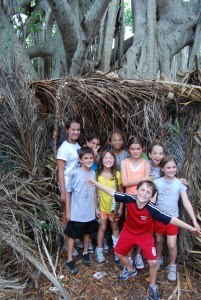 Making friends is more than just a childhood rite-of-passage. Peer socialization – interacting with people of similar age, interests, or background – is crucial from an early age. Studies show that having friends is one of the keys to healthy psychological and social development. On the surface, it might seem that kids receive plenty of socialization at school, but opportunities for meaningful peer interaction are limited in most classroom settings. A rigidly structured schedule and classroom rules, by necessity, don’t leave much time for discussion, sharing, and bonding. In fact, some research shows that homeschooled children tend to have more advanced social behavior than their traditionally schooled peers. This is in part because the homeschooled children socialize with a wider age range, including adults, and also due to the fact that their parents are often conscientious about providing outside opportunities for socialization.
Making friends is more than just a childhood rite-of-passage. Peer socialization – interacting with people of similar age, interests, or background – is crucial from an early age. Studies show that having friends is one of the keys to healthy psychological and social development. On the surface, it might seem that kids receive plenty of socialization at school, but opportunities for meaningful peer interaction are limited in most classroom settings. A rigidly structured schedule and classroom rules, by necessity, don’t leave much time for discussion, sharing, and bonding. In fact, some research shows that homeschooled children tend to have more advanced social behavior than their traditionally schooled peers. This is in part because the homeschooled children socialize with a wider age range, including adults, and also due to the fact that their parents are often conscientious about providing outside opportunities for socialization.
Humans are a social species, and developing bonds with others comes naturally, starting with an infant’s connection with his caregivers. Once kids move to a setting outside of the nuclear family, like a daycare or preschool, socialization becomes a bigger part of their lives. An NYU Child Study Center report showed that three-quarters of preschoolers have friends. Early friendships are based on playing together and helping one another. As kids grow older, they can build on these social skills to develop more complex relationships and expand their circle of friends.
Friends are kids’ confidantes, sounding boards, and pillars of support for the ups and downs of childhood. Unfortunately, there’s no handy manual of social rules and expectations. People learn what is and isn’t acceptable primarily through trial and error. Friendships provide kids with these opportunities and help them learn about the give and take required in all types of relationships. Though painful, it’s equally important to practice the negative aspects of social interaction, like rejection, exclusion, and unkindness. Learning how to deal with the resulting sadness, anger, and frustration is crucial to competent socialization. Mastering these skills during childhood makes passage into the adult world, with its new social challenges like workplace hierarchy, an easier transition.
When used to refer to children, the word “peer” is often used interchangeably with “age mate,” but there is a distinction. Some kids may find they have more shared interests with older or younger people. This is not uncommon among gifted children, who can feel excluded by their age mates due to their cognitive differences. Children with special needs may face challenges with peer socialization as well. Kids of all cognitive levels will struggle at some point with making friends, maintaining friendships, and getting along with others. That’s why it’s important for parents to provide kids with channels for real-life socialization outside of a school setting. Many kids will find their niche with people other than their classmates. Extracurricular activities like sports, clubs, and summer camp provide opportunities to meet people in both similar and different age groups with shared interests.
Just like adults, kids have varying social needs. Introversion is often confused with shyness, but in reality, it’s simply a different but equally valid approach to social situations. Introverted children can flourish with a small handful of close friends and may feel drained by extensive socializing, while extroverts generally prefer a bigger network of acquaintances and draw energy from large groups. Trying to force a “shy” child into social situations, such as playdates, may backfire and cause him to withdraw further. Introducing kids to an environment where relationships can develop organically is more likely to produce desirable results.
Recreational camp is a perfect place for kids to forge lasting friendships, and to learn to navigate the choppy waters of social norms. At Camp Live Oak, getting outside of the traditional classroom structure allows kids to meet new people in a safe, fun environment. Campers are immersed in activities that allow them to explore and expand their interests, and meet others who feel the same way. Camp Live Oak offers team-building activities that develop interpersonal skills, including trust in others and achieving goals as a group. Older kids can benefit from a teen leadership retreat, where they can meet like-minded young people interested in mapping out a successful future.[/vc_column_text][/vc_column][/vc_row]
